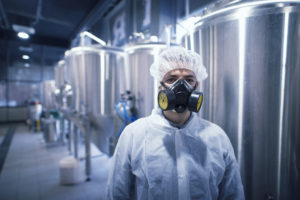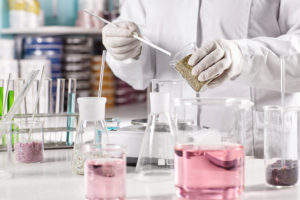From cleaning wounds to disinfecting surfaces, isopropyl alcohol is a versatile and widely used product. But have you ever wondered what makes it so effective? In this article, we will delve into the science behind isopropyl alcohol, explaining how it works and why it is such a powerful disinfectant.
Isopropyl alcohol, also known as rubbing alcohol, is a colorless liquid that is commonly used for cleaning and sanitizing. It has strong antibacterial, antiviral, and antifungal properties, making it incredibly effective at killing various microorganisms.
The secret lies in isopropyl alcohol’s ability to denature proteins. When it comes into contact with cell membranes, it disrupts the structure and function of vital proteins, leading to the death of the organism. Additionally, isopropyl alcohol has a dehydrating effect on cells, further inhibiting their growth and survival.
Apart from its powerful antimicrobial properties, isopropyl alcohol is also highly volatile, allowing it to evaporate quickly. This means it leaves no residue behind, making it a convenient and efficient choice for cleaning and disinfecting.
In conclusion, understanding the science behind isopropyl alcohol helps us appreciate its effectiveness as a disinfectant. Its ability to denature proteins and dehydrate cells make it a potent tool for killing microorganisms and maintaining a clean and hygienic environment.
Chemical composition and properties of isopropyl alcohol
Isopropyl alcohol, also known as rubbing alcohol, is a colorless liquid that is commonly used for cleaning and sanitizing. It is composed of carbon, hydrogen, and oxygen atoms, with the chemical formula C3H8O. Isopropyl alcohol is classified as a secondary alcohol, meaning that the hydroxyl group (-OH) is attached to a carbon atom that is also bonded to two other carbon atoms.
One of the key properties of isopropyl alcohol is its ability to dissolve a wide range of substances, including oils, fats, and proteins. This makes it an effective solvent for cleaning purposes. Isopropyl alcohol also has a relatively low boiling point of around 82.6 degrees Celsius (180.7 degrees Fahrenheit), which contributes to its quick evaporation.

How isopropyl alcohol kills bacteria and viruses
The secret to isopropyl alcohol’s effectiveness lies in its ability to denature proteins. When it comes into contact with cell membranes, it disrupts the structure and function of vital proteins, leading to the death of the organism. The alcohol molecules penetrate the outer layers of the microorganism, causing the proteins to unfold and lose their shape. This disruption prevents the microorganism from carrying out its normal cellular functions, ultimately leading to its demise.
In addition to denaturing proteins, isopropyl alcohol also has a dehydrating effect on cells. It disrupts the lipid membranes of the microorganisms, causing them to lose their ability to retain moisture. This dehydration further inhibits their growth and survival. Isopropyl alcohol’s dual mechanism of action, denaturing proteins and dehydrating cells, makes it a potent tool for killing bacteria and viruses.
The effectiveness of isopropyl alcohol as a disinfectant
Isopropyl alcohol is highly effective as a disinfectant due to its broad-spectrum antimicrobial properties. It can effectively kill a wide range of microorganisms, including bacteria, viruses, and fungi. This makes it a valuable tool in healthcare settings, where preventing the spread of infections is of utmost importance.
The concentration of isopropyl alcohol plays a crucial role in its effectiveness as a disinfectant. Higher concentrations, typically between 60% and 90%, are more effective at killing microorganisms. This is because lower concentrations may not denature proteins and dehydrate cells as effectively.
When using isopropyl alcohol as a disinfectant, it is important to ensure that the surface or area is thoroughly wetted with the alcohol and given enough contact time for it to be effective. The alcohol should be left on the surface for at least 30 seconds to a minute before being wiped away or allowed to evaporate.
Common uses of isopropyl alcohol in healthcare and household settings
Isopropyl alcohol finds a wide range of applications in healthcare and household settings. In healthcare, it is used for cleaning and disinfecting medical instruments, surfaces, and equipment. It is commonly used to sanitize the skin before injections or surgeries, as well as to clean wounds and prevent infection.
In household settings, isopropyl alcohol is a popular choice for disinfecting surfaces, especially in high-touch areas such as kitchens and bathrooms. It can also be used to clean electronic devices, remove adhesive residues, and sanitize personal items such as toothbrushes and thermometers.
Isopropyl alcohol, also known as rubbing alcohol, has several common uses in both healthcare and household settings:
In Healthcare Settings
- Disinfecting Surfaces: It’s widely used for sanitizing hard surfaces and equipment due to its effectiveness against bacteria, viruses, and fungi.
- Hand Sanitizer: It forms a key ingredient in many hand sanitizers for its germ-killing properties.
- Antiseptic for Skin: Before injections, blood draws, or minor surgical procedures, it’s used to clean the skin to prevent infection.
- Cleaning Wounds: It can be used to clean minor cuts or abrasions, although it may cause stinging.
- Cooling Sponge Baths: For reducing fever or body temperature, as it evaporates quickly, cooling the skin.
In Household Settings
- Cleaning Electronic Devices: It’s used to clean electronic gadgets like mobile phones, keyboards, and screens as it evaporates quickly without leaving residue.
- Window Cleaner: Mixed with water, it can be an effective cleaner for windows and mirrors.
- Removing Sticky Residues: It can dissolve adhesives, making it useful for removing labels, stickers, and glue residues.
- Homemade Disinfectants: Often mixed with water or other ingredients to create disinfecting solutions for surfaces.
- Deodorizing Shoes: Spraying a bit inside shoes can help in killing bacteria that cause odor.
Safety precautions when using isopropyl alcohol
While isopropyl alcohol is generally safe to use, it is important to take certain precautions to ensure safety. First and foremost, isopropyl alcohol should be kept out of reach of children and pets, as ingestion can be harmful. It is also highly flammable, so it should be stored away from open flames or sources of ignition.
When using isopropyl alcohol, it is advisable to work in a well-ventilated area to avoid inhaling the fumes. It is recommended to wear gloves to protect the skin and avoid prolonged contact with the alcohol. If accidental ingestion or exposure occurs, it is important to seek medical attention immediately.
Safety Precautions
- Flammability: It’s highly flammable and should be used away from open flames or high heat.
- Skin and Eye Irritation: Prolonged skin exposure can cause irritation, and it should be kept away from eyes.
- Inhalation Risks: Inhaling its vapors in large amounts can be harmful.
- Ingestion Hazard: It is toxic if ingested and should be kept out of reach of children and pets.
Isopropyl alcohol vs. other disinfectants: a comparison
Isopropyl alcohol is a popular disinfectant, but it’s important to compare it with other common disinfectants to understand its strengths and limitations. Here’s a comparison with some other widely used disinfectants:
Isopropyl Alcohol
- Effectiveness: Good against bacteria, fungi, and viruses.
- Evaporation: Evaporates quickly, leaving no residue.
- Surface Suitability: Safe for most surfaces, including electronics, but can damage some plastics and varnishes.
- Skin Compatibility: Can be used on skin but may cause dryness and irritation with frequent use.
- Toxicity: Toxic if ingested; flammable.
Bleach (Sodium Hypochlorite)
- Effectiveness: Highly effective against a wide range of pathogens, including tough-to-kill spores.
- Evaporation: Does not evaporate quickly; requires rinsing when used on surfaces that come in contact with food.
- Surface Suitability: Can be corrosive, damaging metals and fabrics, and discoloring surfaces.
- Skin Compatibility: Harsh on skin and mucous membranes; can cause burns.
- Toxicity: Toxic if ingested and produces harmful fumes; should be used in well-ventilated areas.
Hydrogen Peroxide
- Effectiveness: Effective against bacteria, viruses, yeasts, and spores.
- Evaporation: Decomposes into water and oxygen, leaving no residue.
- Surface Suitability: Generally safe for most surfaces, but may cause bleaching or discoloration over time.
- Skin Compatibility: Less irritating to the skin than isopropyl alcohol or bleach.
- Toxicity: Low toxicity but can cause irritation in the eyes, skin, and respiratory system.
Ethanol (Ethyl Alcohol)
- Effectiveness: Similar to isopropyl alcohol, effective against many viruses, bacteria, and fungi.
- Evaporation: Evaporates quickly, similar to isopropyl alcohol.
- Surface Suitability: Safe for most surfaces, including glass and electronics.
- Skin Compatibility: Can be used on the skin but may cause dryness.
- Toxicity: Flammable and toxic if ingested.
Quaternary Ammonium Compounds (“Quats”)
- Effectiveness: Effective against bacteria, viruses, and fungi.
- Evaporation: Does not evaporate quickly; leaves a residual antimicrobial film.
- Surface Suitability: Safe for most surfaces but can leave a film or residue.
- Skin Compatibility: Generally safe but can cause irritation with prolonged exposure.
- Toxicity: Low toxicity but can be irritating to the eyes and skin.
Comparison Summary
- Effectiveness: While all these disinfectants are effective, bleach is particularly strong against a wide range of pathogens, including spores.
- Surface and Material Safety: Isopropyl alcohol and ethanol are generally safer for a wide range of surfaces, including sensitive ones like electronics. Bleach is more corrosive.
- Skin and Respiratory Safety: Hydrogen peroxide and quats tend to be less harsh on the skin compared to isopropyl alcohol and bleach.
- Residue and Evaporation: Isopropyl alcohol and ethanol evaporate quickly, leaving no residue, which is advantageous in many cleaning scenarios.
Isopropyl alcohol and COVID-19: its role in preventing the spread
Isopropyl alcohol has played a significant role in preventing the spread of COVID-19, primarily due to its effectiveness in killing viruses, including coronaviruses like SARS-CoV-2, the virus responsible for COVID-19. Here are some key aspects of how isopropyl alcohol has been used in this context:
Surface Disinfection
- Virucidal Properties: Isopropyl alcohol is effective against enveloped viruses, which include coronaviruses. It disrupts the virus’s lipid envelope, inactivating it.
- Cleaning Surfaces: It’s used to disinfect frequently touched surfaces like doorknobs, countertops, and handrails, reducing the risk of surface transmission.
Hand Hygiene
- Hand Sanitizer: A key ingredient in hand sanitizers, isopropyl alcohol is used for hand hygiene, especially when soap and water are not available. Hand sanitizers with at least 60% alcohol are recommended by health authorities like the CDC for effective disinfection.
- Preventing Hand-to-Face Transmission: Regular hand sanitizing helps prevent the transfer of the virus from surfaces to the face, a common transmission route.
Personal Protective Equipment (PPE) and Tools
- Disinfecting PPE: Isopropyl alcohol is used for disinfecting certain types of personal protective equipment, such as face shields and goggles.
- Cleaning Medical Instruments: In healthcare settings, it’s used to clean non-critical medical devices and instruments.
Public and Healthcare Settings
- Widespread Use in Healthcare: Hospitals and clinics use isopropyl alcohol for surface disinfection and as a hand disinfectant.
- Public Spaces: It’s used in public transport, offices, and other communal areas to disinfect surfaces.
Safety and Efficacy
- Rapid Action: It acts quickly against the coronavirus on surfaces and skin.
- Safety Measures: While effective, it must be used with caution as it is flammable and can be drying to the skin.
Limitations
- Not a Standalone Solution: Isopropyl alcohol is part of a broader set of hygiene and preventive measures, including wearing masks, maintaining social distance, and vaccinating.
- Surface Compatibility: Care should be taken with certain surfaces, as it can cause damage to some plastics and varnishes.
The widespread availability and effectiveness of isopropyl alcohol against the COVID-19 virus have made it an invaluable tool in the global effort to reduce transmission. Its use, combined with other preventive measures, has been crucial in managing the pandemic.
Buying and storing isopropyl alcohol: what to look for
When buying and storing isopropyl alcohol, there are several important factors to consider to ensure safety and effectiveness. Here’s a guide to help you:
Buying Isopropyl Alcohol
- Concentration:
- Look for a concentration of 70% or higher, as this is effective for disinfection purposes.
- 70% isopropyl alcohol is often preferred for skin and surface disinfection because it’s effective yet less dehydrating to the skin than higher concentrations.
- Purity:
- Choose a product labeled as “medical grade” or “pharmaceutical grade” for higher purity and reliability.
- Packaging:
- Ensure the product is in a sealed, tamper-evident container.
- Look for containers that are sturdy and resistant to leakage.
- Expiration Date:
- Check the expiration date to ensure the product’s effectiveness. Isopropyl alcohol can lose its potency over time.
- Safety Information:
- Look for products with clear safety and usage instructions.
Storing Isopropyl Alcohol
- Cool and Dry Place:
- Store in a cool, dry area away from direct sunlight and heat sources, as isopropyl alcohol is flammable.
- Ventilation:
- Ensure the storage area is well-ventilated. Fumes from isopropyl alcohol can be harmful if inhaled in large amounts.
- Original Container:
- Keep it in its original container to avoid contamination and to ensure that safety information and expiration dates are retained.
- Away from Children and Pets:
- Store in a place out of reach of children and pets due to its toxic nature if ingested.
- Fire Safety:
- Be aware of its flammability. Store away from any potential sources of ignition, like open flames or electrical equipment that may spark.
- Avoid Plastic Containers for Long-term Storage:
- For long-term storage, avoid using plastic containers as isopropyl alcohol can leach chemicals from certain plastics over time.
- Seal Tightly:
- Ensure the lid is tightly sealed to prevent evaporation and leakage.
- No Mixing:
- Do not mix with other chemicals or dilute with water unless specifically required for certain applications.
By following these guidelines, you can ensure that your isopropyl alcohol remains effective and safe for use, whether for medical, cleaning, or other purposes.
Conclusion: the importance of isopropyl alcohol in maintaining cleanliness and hygiene.
In conclusion, isopropyl alcohol plays a crucial role in maintaining cleanliness and hygiene, both in personal and public spaces. Its importance is underscored by several key factors:
Broad-Spectrum Disinfectant
- Effectiveness Against Pathogens: Isopropyl alcohol is a potent disinfectant against a wide range of pathogens, including bacteria, viruses, and fungi. Its ability to quickly inactivate these organisms makes it invaluable in preventing the spread of infections.
Versatile Applications
- Diverse Use Cases: Its applications range from personal hygiene in the form of hand sanitizers to professional use in healthcare settings for sterilizing medical equipment and surfaces. In households, it is a go-to solution for cleaning and disinfecting various surfaces.
Convenience and Accessibility
- Ease of Use: Isopropyl alcohol is easy to apply and does not require complex preparation or equipment. Its rapid evaporation rate means it leaves surfaces dry and residue-free.
- Availability: It is readily available in most pharmacies and stores, making it accessible for everyday use by the general public.
Complementing Other Hygiene Practices
- Part of a Hygiene Regimen: While not a standalone solution, isopropyl alcohol complements other hygiene practices like handwashing, wearing masks, and social distancing, especially during health crises like the COVID-19 pandemic.
Safety and Precautions
- Safe When Used Properly: With appropriate concentration and application, it is safe for most uses, though precautions are necessary due to its flammability and potential skin irritation.
Impact on Public Health
- Contribution to Public Health: The widespread use of isopropyl alcohol, especially during health emergencies like the COVID-19 pandemic, has been instrumental in controlling the spread of infectious diseases.
In summary, isopropyl alcohol’s efficacy as a disinfectant, along with its ease of use and accessibility, make it an essential component in maintaining hygiene and cleanliness. Its role in public health, particularly in mitigating the spread of infectious diseases, underscores its importance in both everyday life and professional healthcare settings. As with any chemical agent, it’s crucial to use isopropyl alcohol responsibly and according to safety guidelines to maximize its benefits while minimizing risks.








